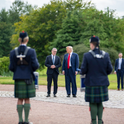Brexit raises profound constitutional questions. Age-old arguments about our political system have resurfaced. What is parliament for? How should we accommodate referendums in a representative democracy? Should MPs listen more to voters or their own consciences?
Legal and constitutional expert Igor Judge has some firm opinions. From 2008-2013 he was Lord Chief Justice and Head of the Judiciary of England and Wales, at the top of the legal hierarchy along with the President of the Supreme Court. Prior to that he was the first President of the Queen's Bench Division of the High Court.
Now 77, he sits in the Lords as a cross bencher. We met in Westminster in mid-January, with parliament in meltdown and Britain facing its greatest political challenge since the war. How did we get here? What will be the effects on our constitution?
“We are now living with the consequences of two different arrangements for a democracy to work, crashing into each other,” said Judge. “The resolution is not provided for in our constitution, because our constitution is not based on referenda."
Judge is a careful talker, pausing to consider each point and clarify his arguments. When pondering a question he sometimes takes off his glasses. The central difficulty, in his view, is that Britain is a parliamentary democracy but in 2016 became a direct one. The two systems do not fit well together and the first is now struggling to accommodate the second. “In the Commons there seems to be a majority in favour of Remaining, and there’s a clash with the result of the referendum.” MPs are struggling to implement an outcome they fundamentally disagree with.
Arguably referendums are never a good idea. For Judge, a plebiscite makes sense “in relation to the possible independence of the constituent parts of the United Kingdom,” Scotland being the obvious example. On other issues they are best avoided, even to settle Brexit, where campaigners for a second ballot are gaining traction.
"I don't think it would help," Judge said, dismissing the “people’s vote” plan. "I mean, let's say the result was the same, it wouldn't stop the people who think we should remain, going on fighting to remain. Let’s say the result is different, it won't stop the people who want to leave saying we must leave and let's have another referendum. So it may provide a temporary answer but it doesn't provide a real answer."
So where should MPs look for a real answer? "If I were an MP, the first question I would ask would be what did the country say" and there must be an allowance “for the referendum result and the problems if it is rejected.” The next question should be what an MP thinks him or herself. “You are a member of parliament," Judge said, "there to run the country, and I think that in the modern British political sphere that has been forgotten… each of you has to exercise your judgment in the overall interests of the country.”
Judge's comments recall Edmund Burke's remarks that an MP owes constituents “not his industry only, but his judgment.” They are not there to be a passive vessel but rather to act in accordance with their own principles. Burke was “a deep political thinker," Judge explained. "He recognised there had to be a group of people coming together with a combination of interests to help run the country, or to put up an opposition to whoever's running the country. But he never veered from the basic principle about the nature of that responsibility."
It’s one of the biggest questions in politics: what is the role of an MP? Some politicians seem to have taken the Burkean approach in recent weeks and acted on their own initiative. Dominic Grieve and Nick Boles are two prominent examples on the Conservative benches. Are they entitled to rebel?
“They're like you and me, they're entitled to say what they think,” Judge argued. “I will say this: that I always admire those members of parliament who have disagreed with their party, not necessarily because I agree with what they're saying but because I agree with the principles.”
“One of the politicians of my lifetime I greatly admire, he was a friend of mine, is Ken Clarke. He will simply not vote contrary to what he honestly believes to be the position, and that means among other things he never became leader of the Conservative Party because of his views on Europe. He was not prepared to shift. Why should he shift them now? This doesn't make him popular with his fellow MPs. Corbyn has a record for dissenting himself. Whatever I think about whether he was right to dissent, it's a good principle from time to time, to say ‘I'm sorry but on this issue I disagree with my party.’”
How does political dissent fit in today? Britain has a party system with whips and constituency bodies who hold great sway. Judge acknowledged: "dissenters, people who vote against the party, it's brave to do so because there's a worry that you may be deselected. And that's where the problem arises really, because once you're in this situation it becomes increasingly obvious that you’re really a member of the Conservative Party, Labour, Liberal Democrats, SNP and it inevitably reduces the focus you have on remembering that you are a member of parliament” first and foremost.
Britain is where it is. The first referendum should probably never have been held, but it was. What is the constitutionally proper way forward now?
Judge sat forward. “There should be a free vote" on any Brexit deal that returns to the Commons, he said. "In my view there should be no whipping on these issues… I would have liked this to be resolved by each member of parliament analysing the issues and making up his or her mind as he or she thought best.”
“Ultimately, of course, if enough members of the constituency thought it was sufficiently important and disagreed sufficiently, they wouldn't vote him or her in the next time. But parliament is the country speaking not the party… but I know perfectly well that's sort of idealistic.”
Would a free vote resolve the impasse? There seems to be no majority for any one outcome. But there are high constitutional principles at stake and every MP should, in Judge’s opinion, vote in accordance with their own view. The truth is that "we still have 650 members of parliament. And it's their responsibility to sort this out.” With that, he picked up his coat and hat and strolled out into Westminster. In an age of lightweights, we could do with more parliamentarians like Igor Judge.
With help from Jemma Slingo
Igor Judge on why MPs should remember Edmund Burke
The former Lord Chief Justice spoke to Prospect about the role of parliament and what Brexit means for the constitution
January 22, 2019













